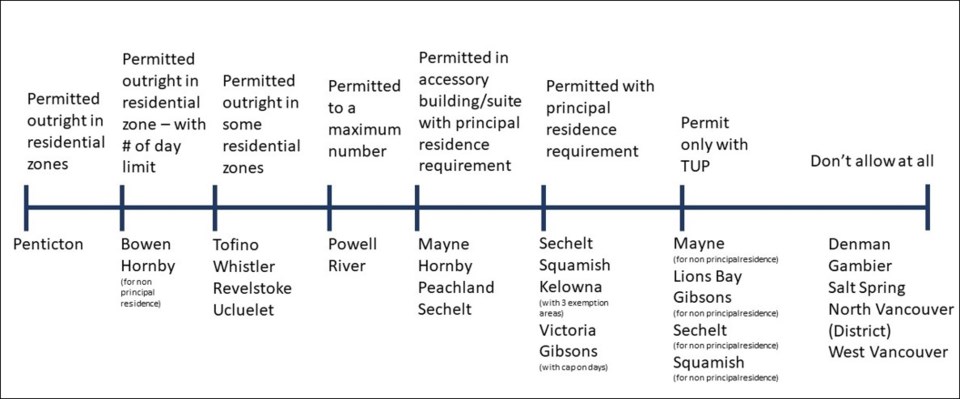Property owners will now have to live at their Bowen residences if they wish to offer them as short-term rentals.
In a split vote at their March 25 meeting, municipal council decided to opt-in to provincial Bill 35, dubbed the Short-Term Rental Accommodations Act. The legislation passed last fall was enacted with the goal of creating more long-term rental options for local residents. The new provisions, including a primary residency condition for operating short-term rentals (STR), applied automatically to towns of 10,000 people or more, with the option for smaller municipalities to sign-on if desired.
With a March 31 deadline to opt-in – and enforcement of the new rules beginning Nov. 1 – earlier this year the question was referred to the Community Economic Development Committee (CEDC) and Housing Advisory Committee (HAC) for feedback. A public survey was also conducted and three open houses held.
Weeks of debate and discussion culminated in the late-March meeting, which began with several of the off-island operators making their case against opting-in during public comments. On Bowen, Bill 35 will affect around 32 properties whose owners live elsewhere. The bill won’t impact the 44 residential guest accommodations (RGA, a type of STR) where the owners live at the property, or the 58 bed and breakfasts (B&B, another type of STR) on the island. Primary residency is defined by the owner living at the home more than half of the year.
The CEDC advised that Bowen wait a year before considering opting-in, while the HAC advised against it. It was later discovered though that a member of the HAC involved in this decision works as an STR manager on the island, prompting staff to advise council to disregard the committee’s motion. Of the 48 letters included in the March 25 agenda, 30 expressed a desire to opt-in while 18 were opposed.
Manager of planning and development Daniel Martin presented four options to council, including staff’s recommendation of opting into Bill 35. In addition to the principal residency requirement, adopting the bill would also mean the province takes over registration, data tracking, and enforcement of the STR rules – all tasks currently performed by the municipality.
Other options included waiting to see how the new rules play out in other communities and opting-in next year, making their own changes at the municipal level without provincial involvement, or leaving the current STR rules as they are.
Coun. Sue Ellen Fast provided her reasons for opting-in to the bill. “I think this is a one-time chance to gain some control over tourism on Bowen… If we don’t opt-in then we’ve got another year of people deciding whether they want to invest or create short-term vacation rentals on Bowen, when they can’t do it anymore in communities around us.” Nearby small communities including Squamish, Sechelt and Gibsons are included in Bill 35.
“We should be thinking about communities first, not individuals. What we heard in the Official Community Plan last time we updated it was that affordable housing was one of the dominant community themes… and that was before the short-term vacation rentals of principal residences came in,” said Fast.
Coun. Judith Gedye cited the conduct of some visitors to STR properties when an owner is not on-site, including loud parties and disputes with neighbours. “There’s some very good, responsible operators, and there’s a couple of bad apples. That’s always the situation where the regulations start to kick in,” she said.
One of the major arguments against opting-in was the potential loss of tourist revenue, with many of the owners saying they wouldn’t rent out their properties long-term. Gedye said she doesn’t believe the potential loss of the 32 properties to visitors would have a drastic impact. “I don’t accept the idea that if we opt-in we’re going to destroy the economy,” said Gedye.
The councillor added she also doesn’t believe the new rules will force all the off-island owners to sell their properties, addressing another concern expressed by owners should they lose their STR revenue. “I don’t know that we’re necessarily creating that level of hardship, and I think that’s salesmanship in terms of that argument.”
Favour toward opting-in wasn’t shared around the table though. “I think the people who frequent the STR’s contribute to the viability of businesses on Bowen,” said Coun. Alison Morse, adding she didn’t believe many of the properties in question were suitable for long-term rental use.
Coun. John Saunders said he’d like to see a local solution to Bowen’s rental housing shortage. “I have a lot of confidence that the options that could be considered (by municipal staff)… would be well-considered, and probably really fruitful and useful to us,” he said, expressing his desire to wait until next year’s opt-in period to revisit the topic.

Mayor Andrew Leonard says if Bowen did not opt-in he fears the island will become a destination for off-island investors as one of the last towns in the area without a principal residency requirement for STR use. “While I think our current policy is a good one, it is also less restrictive than many of the other communities that are feeling the pressures of tourism and use of on-island infrastructure.”
The mayor also supported the idea of the province taking work off the hands of municipal staff by conducting registration and enforcement of STR’s moving forward. Regarding the property owners who would be impacted, Leonard pointed out that more than three-quarters of Bowen’s 136 STR’s would remain unaffected, and that the 32 properties in question have received certain advantages over time.
“I am sympathetic to non-residents who are operating RGA’s in their homes currently. I believe some of my comments in public so far are that those properties are already exempt from the speculation and vacancy tax. Many of those properties don’t carry mortgages, they have appreciated in value incredibly over the last number of decades, and there are mechanisms to offset the cost of carrying those properties that simply aren’t available to folks who don’t have a home to begin with,” said Leonard.
“I think the need is to balance the needs of residents, future residents, and current residents who are being forced to move off the island, with the needs of tourism. I believe this strikes that balance,” concluded the mayor.
Leonard was joined by Fast, Gedye, and Coun. Alex Jurgensen in voting to opt-in. Morse and Saunders were the opposition in the 4-2 vote. Coun. Tim Wake had recused himself from the discussion and vote due to his role as operator of an STR.



